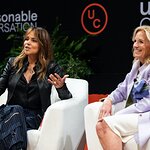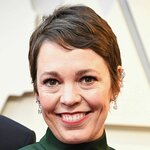By Delinda Lombardo on
Amy Sewell is the creator/writer/producer of Paramount’s 2005 crowd-pleasing documentary, Mad Hot Ballroom_. Her directorial debut, "_What’s Your Point, Honey?":http://www.whatsyourpointhoney.com/front, puts a new face on political leadership by introducing seven possible female contenders coming down the pipeline, while revealing inequalities that still exist today. What’s Your Point, Honey? is now showing in theaters across the US in special ‘one-night only exclusive’ events.
Tell us a little bit about What’s Your Point, Honey?
One big premise of the movie is that ‘you can’t be what you can’t see’. The idea started when my daughter told me I couldn’t ride a motorcycle because she’s never seen a woman on a motorcycle. And I thought what else is out there that they’re not seeing, that they would never even think possible because its just isn’t in front of them. The movie itself is really like a picture in the moment in time, it’s a mirror on society – about the next generation of women, where we are and where we’re going. It’ll make you laugh, kinda make you cry, it’s not hard hitting, it’s very much like ‘Mad Hot Ballroom’. If you want to get more out of it, it definitely runs deep, you can find all the metaphors that run throughout or you can just go along and look at the portraits of the seven possible future presidential candidates. So it’s light, I always say my style of film making is ‘doc-light.’
What’s idea behind ‘exclusive’ one-night-only screenings?
It’s being released in theaters in these one-night-only exclusive events, where you can also purchase a copy of the DVD, because there’s no reason for us to get involved with box office numbers and compete with ‘Indiana Jones’ or ‘Iron Man.’ We care about reach, and the best reach is to have people watch the DVD and start the conversation in their community.
Six years ago, with the support of the The White House Project, “Cosmo Girl!” launched “Project 2024” to get more young women involved in politics. How has this helped the cause?
When we had the seven young woman through the ‘White House Project’ and ‘Cosmo Girl’ they became more tangible, more achievable role models. Basically on our website we list what their strengths are, and I always think if we put all of them together we’d have an ideal president. But our message is, it’s not about one, each of them bring something to the table – the day we see just as many women on the debate podium is the day we get beyond gender to agenda.
At the recent ‘Women in Entertainment Production Panel’, you mentioned that after the attacks on 9/11, you started covering the kids angle – what third graders would do if they could rebuild the buildings. What, if anything, did you learn from these kids?
Basically, kids just think honestly. One kid wanted to rebuild the buildings out of rubber so the planes would bounce off it next time, and another kid said he wanted to rebuild it with holes in it so the planes could fly through. And at that moment, I realized it’s the best state to be in – a kind of kids state – because they rarely think about obstacles or barriers. They don’t have any filters. It was probably more of an influence than anything on making me think well – we really are prisoners to our own definitions or societies definitions. It’s exhausting to have those things around really, why can’t we just ignore them?
How do you feel about the TV/Media fueling inequalities? For example, ‘Americas Next Top Model’- are we creating the next generation of Paris Hilton's, or are we empowering young woman?
I think we have to counter that and fight it. So by me putting seven awesome young women up on the big screen and saying these are role models, and not letting my kids read magazines where they make Paris Hilton or Lindsay Lohan or Britney Spears role models, I hope I’m doing my part. But what I think we have to do is celebrate those who are good role models. I’m trying to emphasis the positive people who make positive choices.
Who would you most like young women to look up to or be inspired by?
Gosh, there are so many. I think there are ton of women athletes out there. I think you have to go to some of the different levels – go to the smaller games, not the ‘star’ games. I know they are out there, and I think we always have to be on the lookout to find them. My family and I go to a ton of college games or high school games and we look for the real life heroes. I think the more and more we get our kids into contributing to our society in a healthy way – whatever that means – then they won’t really care about the Britney’s. We [her family] love Angelina Jolie and Natalie Portman. Hanna Montana said she made a mistake and I still think she’s an OK role model, but she gave us an opportunity to talk about it. We love Raven. We love America Ferrera. Any of the younger kids have to be smart enough not to be persuaded to do crazy things by their managers. We also love Kate Hudson, especially when she and her mother speak out about women’s issues.
You mentioned female athletes? Where do sports fit into the equality issue?
The next generation – which we show in the film – includes sports and fathers. Sports teach us how to compete, fall, get up, not cry, and learn to not only lose – which is important – but win really well and triumphantly with no apologies. Fathers – while they may not care if their wives, mothers or sisters are being treated equally – it’s hell or come high water if their daughters are treated differently, and so regardless of the fathers actual involvement, their daughters will pick up that mentality and she’ll bring it into the business world, into the sports world, into the military and into politics.
Tell us a bit about your new book, “She’s Out There! The Next Generation of Presidential Candidates”?
It’s going to be released April 9. It’s about 35 women under the age of 35 who aspire to lead and possibly run for President. They write their own essays and I took a photographer around the country with me and we took pictures of these women doing what they do everyday. So the premise of the book is: you don’t know if she’s sitting next to you, you don’t know if it’s your neighbor down the block – the fact is that there are going to be a lot more women out there who want to run for office, it’s the beginning of the next generation of candidates.
Politics seem to be a sort of ‘men-club’, so I’m curious how receptive the ‘men in charge’ will be– and what effect, if any, have you noticed since Hillary decided to run for President? Are women going to be equal in the political arena?
I think that will happen naturally, it’s happening already. I think if you think about what is happening – there are 75% of women who fill the political positions of their fathers or husbands after they died, those are the women that are in there now. And I think it will be a long time before we see a group of women march forward running for office. We’ll have to see in 2012, I hope it would be sooner, but I actually don’t think that men have a choice about what’s happening now. For the last 40 years we’ve waited to become equal and I think that waiting is over, we’ve realized that they haven’t given it to us. So I think those days are over and that men need to join in because they will be facing female opponants and Hillary was just the beginning of showing us that we can hang with the big dogs.
What are some of the more important issues/problems with inequality?
We need three things. Equal pay. I’m willing to hang out at 77-cents to the white man’s dollar until our black sisters at 67-cents catch up – until our hispanic sisters at 57-cents catch up, and once we are all making 77-cents, we can all march to the block because I don’t want to leave them behind. Feminism is not a white women’s sport, it’s just we don’t have the double whammy of racism. The second thing is ownership of body – the fact and mentality that we are treated like property. If men got pregnant, no governement in the world would tell them what they could do with their bodies. The third thing is child care and elder care. It does fall primarily on women, and we are devalued because of it. If men had these responsibilites fall to them, corporations and government would help. Corporations would come up with perks to keep their men employed – their talent at the office – and the government would help out knowing they didn’t want to lose a valuable sector of the work force. I try to keep it simple on these three things, let’s get that acommplished and then move on.
You are also one of the founders/directors of the nonprofit organization Give It Up for the ARTS! Tell us about more about your involvement and the vision/work of the organization?
It’s to expose children who are at-risk or in a school which may be impoverished… to the arts. It’s dance, drama, music, fine arts, and usually we find a grass roots group, somebody out there working their butt off trying to bring something to a group of kids in at-risk neighborhoods. And that’s who I write a check to every year, and that’s who we look for.
Look to the Stars and Delinda thank Amy Sewell for speaking with us. For more information, please visit What’s Your Point, Honey.
Copyright © 2008 Look to the Stars






